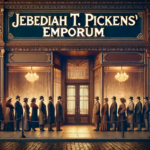
It is a curious thing, but the human mind—while perfectly capable of balancing a checkbook, counting sheep, and determining the square footage of a cow pasture—utterly refuses to operate on logic alone when it comes to what actually moves us. If we were the rational creatures economists pretend us to be, no one would buy a Rolex, stand in line for an iPhone, or pay $6 for a cup of coffee that tastes suspiciously like hot regret.
Yet here we are.
The reason is simple: value is not a mathematical equation; it’s an emotionally expensive performance. If something makes too much sense, it ceases to be interesting. The entrepreneur, the artist, the lunatic in the room—their superpower is that they are not constrained by logic. They understand that a thing must be scarce or ubiquitous, cheap or extravagant, effortless or punishingly difficult—but never comfortably in the middle. The mid-tier, the rational, the sensible? That’s the swamp of the uninspiring.
Consider the economy of persuasion. You can lay out a perfect, bulletproof argument—a neat row of facts, each standing at attention like a well-disciplined soldier—and still lose to the man who tells a slightly ridiculous but profoundly felt story. This is why the grand romantic gesture, the absurdly inefficient ad campaign, and the ridiculously priced handbag all work: their very extravagance conveys meaning.
The committee, bless its soul, will always kill the good idea because it seems “illogical.” But the world was not changed by committees. It was changed by people who knew that absurdity isn’t a flaw—it’s the secret handshake of persuasion.
And that, dear reader, is why logic may win arguments, but it will never win hearts.
And if you think this is all theoretical nonsense, let me tell you about Jebediah T. Pickens.
The Man Who Sold Nothing (For a Fortune)
There was once a man—let’s call him Jebediah T. Pickens—who ran a shop on Main Street that, by all reasonable standards, should have failed spectacularly. The sign out front read:
“J.T. PICKENS’ EMPORIUM OF EXQUISITE NOTHINGNESS”
The shelves were bare. The counters were empty. There was no inventory, no sales pitch, and no discernible reason for the place to exist.
And yet, people lined up around the block to buy absolutely nothing at all.
The town council, consisting of men who believed themselves to be the pinnacle of reason, were baffled. “It makes no sense,” declared Mr. Archibald, who had once bankrupted a hardware store and therefore considered himself a financial expert.
“But does it have to make sense?” Jebediah asked, lounging in his rocking chair outside the store, puffing a cigar bought with the profits from his latest batch of nothing.
“People will only buy what they need,” scoffed Archibald.
“Then why do they buy diamonds? Or front-row opera seats? Or twelve-dollar avocado toast?”
Archibald had no answer for this, and so, as is the custom of men defeated in argument, he declared Jebediah a menace and stormed off.
The Trick of Selling Nothing
Jebediah, you see, understood something that the town council never could: people don’t buy things because they need them. They buy things because they mean something.
He had created an economy of absurdity—where people handed over good money just to be part of the joke. He sold “Limited Edition Empty Boxes” for ten dollars apiece. For an extra five, he’d autograph them. And for his most discerning customers, he offered an exclusive, members-only subscription where, for a modest fee, he would continue to send them nothing in perpetuity.
The richer folk, fearing they might be missing out on a higher-tier of nothingness, demanded an exclusive version of his non-product. And so Jebediah, ever the innovator, launched a new service:
“The Ultra-Rare, Limited-Edition Supreme Tier of Absolutely Nothing.”
It cost a hundred dollars. He sold out in a day.
The Death of Reason (and Why It Didn’t Matter)
The newspapers called it a scandal. The council demanded an investigation. But Jebediah only laughed, because he knew something they didn’t:
People don’t want logic. They want a story worth telling.
His customers didn’t buy nothing—they bought membership into the absurd. They bought the right to lean across a dinner table and say, “Oh, you haven’t heard of Pickens’ Nothing Emporium? Well, let me tell you…”
And that, dear reader, is how Jebediah became the richest man in town—by selling what everyone else overlooked: meaning.
Moral of the Story?
- Logic wins arguments. Absurdity wins hearts.
- The best-selling things in the world—luxury goods, viral ideas, grand romantic gestures—are valuable because they don’t make perfect sense.
- If your strategy makes too much sense to a committee, it’s probably boring.
- And never underestimate a man who can sell nothing.
Now, if you’ll excuse me, I have an idea for an NFT.
This investigation into the absurdity of value is part of The Deductionists—a league of sharp minds unraveling the peculiar and paradoxical. Because if we don’t question it, who will?